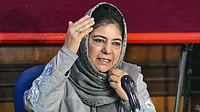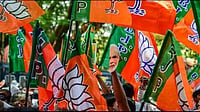Stating that “the freedom of speech and expression guaranteed under the Constitution cannot be stretched to such a limit as to allow a person to question the status of a part of the country or its people”, the High Court of Jammu and Kashmir and Ladakh has ruled that such expressions fall within the definition of “unlawful activity” under the Unlawful Activities (Prevention) Act.
In a judgment delivered on April 22, a single-judge bench of Justice Sanjay Dhar ruled that expressions like “occupation of military or the people being slaves” don’t enjoy the freedoms guaranteed by Article 19 of the Constitution.
The court was hearing a case in which a petitioner named Muzamil Bhat, a lawyer, had challenged an FIR registered under Section 13 of the Unlawful Activities (Prevention) Act registered against himself at Kulgam police station in south Kashmir.
In his petition, the lawyer had stated that six civilians were killed and 60 were wounded, including children, in a blast during a gunfight at Laroo village in Kulgam district on November 21, 2018, triggering outrage across Kashmir.
He said in the petition that the then Union Home Minister condemned these killings and expressed his condolences to families of the deceased and announced a relief of Rs 5 lakh to each family. The petition added that the Governor of the erstwhile state of Jammu and Kashmir had also termed the killing of the six civilians unfortunate.
The petitioner, a resident of Laroo village, made certain comments on Facebook soon after the incident. “For the first time in my life, I felt broken and weak and I could acknowledge that we are slaves and slaves have no life of their own”, and “occupation is like cancer which will consume every one of us”, he wrote on Facebook. He also wrote that such action “reflects the culmination of systemic failure” and “reflects on those heartless structures that celebrate the occupation of military bonhomie in cozy champagne”.
Soon after his posts, a case under Section 13 of Unlawful Activities (Prevention) Act was registered against him. He said in the petition that there was nothing illegal in the posts, which did not come within the definition of ‘unlawful activity’ as contained in Section 2(o) of the Unlawful Activities (Prevention) Act.
The court refuted his contention and noted that such posts indicate that “the petitioner is advocating that this part of the Country is under the occupation of Indian military”.
“The petitioner by uploading these posts has cross (sic) the Lakshman Rekha which demarcates the freedom of expression guaranteed under Article 19,” the judge said.
The court said that one can “criticize the Government for its negligence and express outrage on the violation of human rights”, but “it is quite another to advocate that the people of a particular part of the Country are slaves of the Government of India or that they are under the occupation of armed forces of the Country”.
“This act of the petitioner, therefore, prima facie, falls within the definition of ‘unlawful activity’ as contained in Section 2(o) of the ULA(P) Act punishable under Section 13 of the Act,” the court said.
Bhat invoked the rationale laid down by the Supreme Court in Vinod Dua’s case, but the HC ruled that it was not applicable to the present case. In Dua’s case, the petitioner, the HC noted, “had criticized the functioning of the Government”, and “had not supported and advocated any claim relating to the cession of a part of the country whereas, in the instant case, the petitioner by uploading the posts on his Facebook, has supported the claim of cession of a particular part of the country”.


























